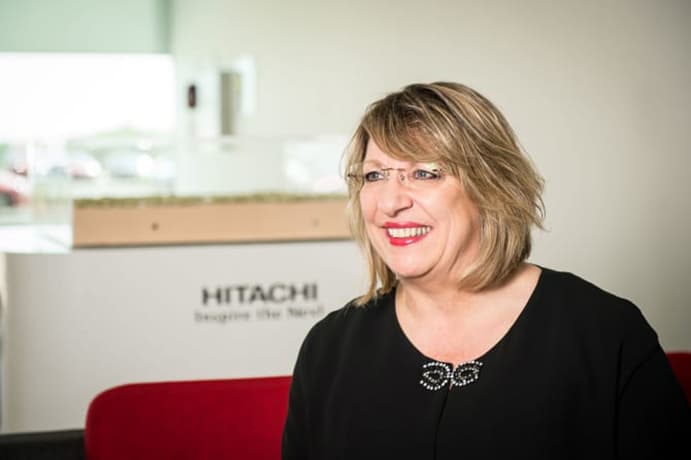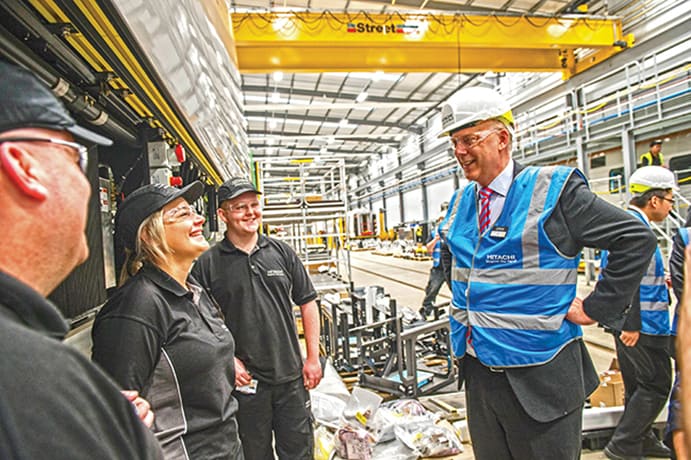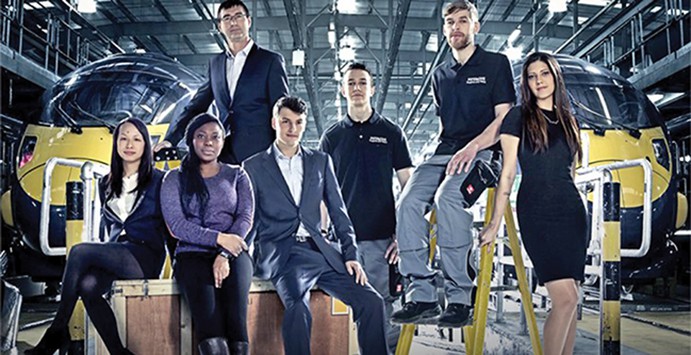Hitachi Rail Europe’s managing director is focused on reaping the benefits of a diverse workforce in the north east. Stuart Nathan reports
The north east of the UK was particularly hard hit by the changes to the industrial landscape of the late 1970s and 1980s. Traditional industries, such as steel, mining and shipbuilding, saw wide-scale facility closures and redundancies, and regional unemployment hit a very high level.

The situation in the region has now improved quite dramatically, with the automotive sector being a particular bright point: Nissan’s plant near Sunderland is the UK’s largest car factory and the most productive in Europe. The rail industry, whose roots are in the north east, is now a major employer in the region once again with the opening in 2015 of Hitachi Rail Europe’s manufacturing hub at Newton Aycliffe in County Durham, which late last year saw the unveiling of the first Intercity train to be built in the plant. Costing over £80m, the Newton Aycliffe factory will employ some 900 people directly by spring of this year, and create many more jobs in the local supply chain as the majority of components for its trains are sourced from within 50 miles of the facility.
The north east of the UK was particularly hard hit by the changes to the industrial landscape of the late 1970s and 1980s. Traditional industries, such as steel, mining and shipbuilding, saw wide-scale facility closures and redundancies, and regional unemployment hit a very high level.
The situation in the region has now improved quite dramatically, with the automotive sector being a particular bright point: Nissan’s plant near Sunderland is the UK’s largest car factory and the most productive in Europe. The rail industry, whose roots are in the north east, is now a major employer in the region once again with the opening in 2015 of Hitachi Rail Europe’s manufacturing hub at Newton Aycliffe in County Durham, which late last year saw the unveiling of the first Intercity train to be built in the plant. Costing over £80m, the Newton Aycliffe factory will employ some 900 people directly by spring of this year, and create many more jobs in the local supply chain as the majority of components for its trains are sourced from within 50 miles of the facility.
Finding the right skills
Despite the industrial hardships that have hit the area, Hitachi Rail Europe managing director Karen Boswell said that the company had little difficulty in finding people with the right skills to staff the plant. “While the challenges the north east has had from industrial perspective are well known, we have been very fortunate to find the skills that we need to come into Newton Aycliffe,” she told The Engineer. “We had well over 17,000 applications, and we found some super people from quite a range of different businesses. We not only had a very wide pool to draw from, we really were able to focus on recruiting people with the right attitude and approach, as well as making sure they had the skill level we needed.” As the company expands the number of shifts operating at Newton Aycliffe, this recruitment is set to continue.
However, Boswell added, as with the rest of the engineering sector, Hitachi Rail Europe faces a challenge in recruitment for the future, and the company intends to play a major role in ensuring that its pipeline of new recruits remains strong. “It really is a challenge,” she said. “There’s 87,000 graduate-level engineers a year needed between now and 2020, and the education system is only producing 46,000 of those.”

This is one of the reasons that Boswell is passionately committed to increasing the diversity of the engineering workforce. Changing the gender balance is one aspect of this: the rail sector is ahead of the engineering industry on average, with 15.5 per cent of its employees female, compared with 9 per cent for the whole sector. But although Boswell is proud of this figure, she is keen to increase female representation and insists that this is not just “diversity for diversity’s sake”. “That’s a massively uninformed view, just looking at the statistics,” she said. “There is so much data out there that diverse businesses outperform in terms of profit and every other metric. Companies in the top quartile for gender diversity are 15 per cent more likely to have financial results above their median for their sector. It’s not just nice to do, it’s absolutely essential from my perspective.” Studies from management consultant McKinsey show that in US companies, every 10 per cent improvement in diversity led to a 3.5 per cent increase in profits. “You can quote similar figures on revenue, and this shows the diversity is something that any business should be thinking about,” Boswell said. “I absolutely believe, from my experience previously, that creating a diverse industry and a diverse workforce absolutely drives business performance.”
Boswell has taken positive steps to try to narrow the gender gap at Newton Aycliffe, including arranging female-only recruitment open days at the plant. “We had over 100 women attend those,” she said. “People need to come in and see what the factory environment is like, and see what the manufacture of trains involves in this current day and age, so on the women’s open days we encouraged people to bring in friends and even parents to help reposition some of the thoughts in their minds that maybe a manufacturing site such as this isn’t the place for girls and women to work. We got the message across, and ended up recruiting a good proportion of the people who came in.”
Good for business
Boswell is adamant that this is good for business. “You need people who are going to think differently, bring something different to the table,” she said. Another aspect of diversity is that Boswell believes it is important for the employees at Newton Aycliffe to reflect the community as a whole. “Skills, I think, is not one strategy; you can’t say that people all need to come from one specific sort of background to go into manufacturing; they don’t all have to be men, they don’t all have to be women, it’s a broad range and a broad mix. I really am passionate that where the business is located you have a responsibility to support the local community and thinking about the demographics of the local community is really important as well.”
There are several examples of this, she said. At Stoke Gifford near Bristol, where Hitachi Rail has a newly built service depot, the company has a partnership with mental health charity Mencap to investigate how it can support disabled people to work in its teams. Boswell mentions age diversity as something she is keen to tackle. “We have a project working with ex-forces personnel,” said Boswell “and, of course, we have Japanese and British teams working together at Newton Aycliffe, and it is really important that we support and ensure the different cultures can work together and socially integrate as well.”

Meanwhile, of course, there is a next generation to think of. Boswell mentions “our graduate programme, our apprenticeship programme and the University Technical College [UTC] programme”. The South Durham UTC, the first of its type in the north east, was co-founded by Hitachi Rail Europe. Located next to the manufacturing site, its ground floor is entirely given over to a well-equipped engineering workroom, including much higher-specification equipment than would normally be seen in a school, including CNC machines and industry-standard coordinate-measuring machines. “We have a financial and a mentoring relationship with the UTC,” Boswell explained. “We don’t supply pure teaching services, as it were, but we do supply teaching materials such as drawings and we connect some of our suppliers who contribute machinery that the students are trained on and also supply similar mentoring on those aspects of their learning.” Pupils at the UTC can expect to learn how to produce components to the exacting tolerances required by industry, and how to ensure they meet the standards, for example.
Career CV
Education
Starting her career without attending university, Boswell describes herself as a business turnaround specialist and was the first female president of the 106-year-old Railway Study Association in 2015.
Career highlights
1996–2000 Regional managing director and business development director, Aramark
2000–2002 Head of on-board services, First Great Western, First Group
2002–2005 Managing consultant, Arawak
2006–2009 Deputy managing director and customer service director, First Capital Connect
2009–2015 Managing director, East Coast Mainline
2015–2016 Deputy chair and director, Ansaldo
2015 Current position
2017 Appointed OBE in New Year’s Honours




Project to investigate hybrid approach to titanium manufacturing
What is this a hybrid of? Superplastic forming tends to be performed slowly as otherwise the behaviour is the hot creep that typifies hot...